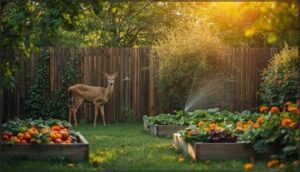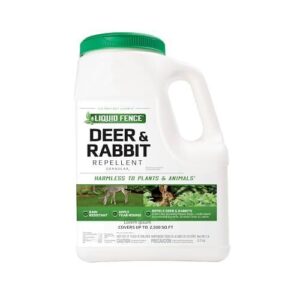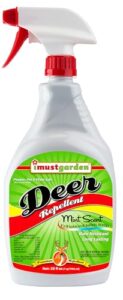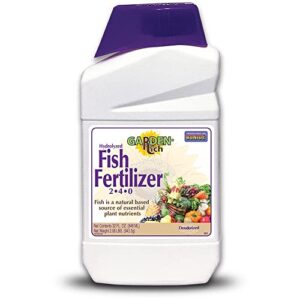This site is supported by our readers. We may earn a commission, at no cost to you, if you purchase through links.
Last summer, a doe and her two fawns turned my carefully tended vegetable garden into their personal salad bar—they decimated $200 worth of heirloom tomatoes in a single night. If you’re reading this, chances are you’ve experienced a similar gut-punch moment watching deer treat your yard like an all-you-can-eat buffet.
The good news? You don’t need chemical warfare or an eight-foot electric fence to reclaim your space. Natural ways to deter deer work by tapping into their evolved survival instincts—using scent, taste, texture, and strategic planting to convince them your garden simply isn’t worth the risk.
From homemade pepper sprays to motion-activated surprises, the most effective approach combines multiple tactics that keep deer guessing and your plants thriving.
Table Of Contents
- Key Takeaways
- Natural Repellents to Deter Deer
- Planting Deer-Resistant Gardens
- Effective Physical Barriers and Deterrents
- Smart Garden Practices for Deer Prevention
- Top 4 Products to Keep Deer Away
- Frequently Asked Questions (FAQs)
- What is the most effective natural deer repellent?
- What smell do deer hate the most?
- What do deer absolutely hate?
- How to stop deer from pooping in your yard?
- How do I keep deer out of my yard at night?
- What smells do deer hate the most?
- Do coffee grounds keep deer away?
- Does Irish Spring soap really deter deer?
- What is the best homemade deer repellent?
- Do deer eat roses?
- Conclusion
Key Takeaways
- Layering multiple deterrents—scent sprays, deer-resistant plants, and physical barriers—works far better than relying on any single method, because deer quickly adapt to predictable tactics.
- Homemade sprays using eggs, garlic, and hot peppers tap into deer’s natural aversion to sulfur and capsaicin, and they’re just as effective as pricey commercial options when reapplied every 7–14 days.
- Planting aromatic herbs like lavender and rosemary, plus toxic bloomers like daffodils, creates a living defense that quietly discourages deer without any ongoing effort from you.
- Rotating your repellents every 10–14 days and removing food attractants like fallen fruit are the two easiest habits that prevent deer from learning to ignore your defenses over time.
Natural Repellents to Deter Deer
You don’t need expensive commercial sprays to protect your garden from deer. A few simple ingredients from your kitchen can create powerful deterrents that actually work.
If you’re also dealing with aphids on your vegetables or flowers, you can use homemade sprays to get rid of aphids using similar natural ingredients.
Let’s look at some proven natural repellents you can make and use right away.
Homemade Egg, Garlic, and Hot Pepper Sprays
You can whip up homemade deer repellent sprays using eggs, garlic, and hot peppers—all non-toxic deer repellents that work surprisingly well.
These DIY deer sprays rely on sulfur compounds from garlic, capsaicin from peppers, and protein films from eggs to create unpleasant flavors. Add a little dish soap for spray adhesion, then reapply every five to seven days (or after rain) to maintain repellent duration.
Hot peppers can be utilized in a chemical-free gardening approach to deter deer and protect your plants naturally.
Scent-Based Deterrents (Soap, Human Hair, Predator Urine)
Beyond sprays, you can also tap into scent-based deer deterrents that trigger natural avoidance behaviors. Soap barriers using Irish Spring Soap or scented bar soap release strong aromas deer dislike. Human hair repellents stuffed in mesh bags mimic human presence, while predator scents like coyote urine sprays create warning zones.
These scent markers work best when:
- Reapplied after rainfall or heavy dew
- Placed 6-12 inches above soil level
- Combined with other deterrents
- Rotated every few weeks
- Positioned around garden perimeters
Understanding the science behind effective scent deterrents for wildlife can help you select and use these products more successfully.
Using Citrus Peels and Vinegar Solutions
Citrus peels offer another layer of defense in your natural deer repellents toolkit. Infuse orange or lemon peels in white distilled vinegar for one to four weeks, strain, and spray around your garden perimeter. This homemade deer repellent combines organic deer deterrents with nontoxic methods—citrus oils create lingering scents deer avoid, while vinegar’s acidity disrupts their foraging patterns.
| Infusion Techniques | Deer Deterrent Recipes |
|---|---|
| 2-4 cups peels per jar | Use undiluted on borders |
| Steep 1-4 weeks minimum | Reapply after rainfall |
| Strain before spraying | Mix 1:1 with water for lighter coverage |
Application Frequency and Best Practices
Your natural deer repellents work best with smart reapplication timing. Spray frequency should follow a 7-to-14-day maintenance schedule during active browsing seasons. After heavy rainfall, refresh your homemade deer repellent within 24 hours to maintain effectiveness.
I recommend deterrent rotation every 2-4 weeks to prevent habituation and seasonal adjustments as food sources decline.
Combine multiple non-toxic deer repellents with deer deterrent plants for layered protection.
Planting Deer-Resistant Gardens
One of the smartest long-term strategies you can adopt is designing your garden with plants that deer naturally avoid. Instead of fighting an uphill battle protecting their favorite snacks, you’re effectively building a living fence that tells deer to move along.
Choosing deer-resistant spring flowers for your beds creates natural barriers that keep hungry visitors from treating your garden like a buffet.
Let’s look at the types of plants that create this natural barrier and how you can incorporate them into your landscape.
Aromatic Herbs and Strong-Smelling Plants
You can utilize the power of aromatic deer control by planting fragrant herb gardens filled with deer deterrent plants like rosemary, lavender, and sage. These natural deer repellents release pungent flower beds of scent when brushed, creating scented plant borders deer avoid.
Mint (with its essential oils) and thyme work particularly well in smelly garden plants that protect your beds while adding culinary value to your landscape.
Thorny, Fuzzy, and Textured Foliage Choices
Texture becomes your secret weapon in plant protection when you choose deer resistant outdoor plants with prickly stems, fuzzy leaves, or corrugated surfaces. Deer avoid these natural deer repellents because thorny plants make browsing uncomfortable, while dense pubescence signals tough, unpalatable tissue.
Garden layering with these textured choices creates multi-season defense—think Russian sage paired with barberry for dual deterrence that thrives in zones 7-9.
Flowering Plants Deer Avoid (Daffodils, Marigolds, Lavender)
Daffodils pack lycorine—a toxin that makes deer think twice about browsing your beds. You’ll want to pair them with marigolds (whose citrusy scent creates scented barriers) and lavender for layered garden protection.
These flowering deterrents work best in plant combinations: marigolds up front, taller daffodils behind, lavender margins. This natural pest management approach gives you deer-resistant outdoor plants with genuine curb appeal.
Incorporating Regional Deer-Deterrent Plants
Your region’s native perennials offer the smartest deer-resistant landscaping because they’ve coevolved with local wildlife—think purple coneflower and black-eyed Susan for natural wildlife deterrents.
Regional gardening with native plant selection creates ecological balance while deer repellent methods stay organic.
Joe Pye weed and switchgrass form tough barriers deer bypass, giving you deer-resistant outdoor plants built for your climate’s challenges.
Effective Physical Barriers and Deterrents
When repellents and plants aren’t quite cutting it, physical barriers offer your most reliable line of defense against persistent deer. I’ve seen homeowners try everything from creative DIY solutions to high-tech deterrents, and the truth is, the right combination depends on your space and budget.
Let’s look at the most effective barrier options that actually work to keep deer out of your garden.
Building and Maintaining Deer-Proof Fencing
If you want a barrier that truly keeps deer out, you’ll need to think about fence height standards—at least 8 feet tall works best. Post spacing every 8 to 12 feet maintains stability, while material choices like galvanized steel resist rust.
Don’t overlook gate design with secure latches, and follow maintenance schedules to catch sagging or damage early. Proper deer proofing your garden means investing in solid garden security measures from the start.
Using Netting, Cages, and Tree Guards
When deer damage threatens your young trees and tender crops, garden protection starts with the right barrier installation. Wildlife protection demands smart choices:
- Netting materials with 1/4 inch mesh draped over fruit trees block access while letting light through
- Cage designs using 1/2 to 1 inch welded wire reach 3 to 5 feet tall around saplings
- Tree guard types include spiral wraps for trunks up to 4 inches in diameter
- Secure stakes every 3 to 4 feet prevent wind gaps deer can exploit
- Inspect barriers every 1 to 2 weeks after storms for tears
These garden security measures offer reliable plant protection when combined with deer repellents.
Motion-Activated Sprinklers and Lights
Beyond physical barriers, motion sensors paired with sprinkler systems deliver startling but harmless surprise bursts when deer approach. These outdoor wildlife control devices scan up to 40 feet and trigger a 3 to 7 second water jet—enough for effective animal deterrents without waste.
Add night lighting for a combined visual punch. Pair them with deer repellents for layered wildlife control that conditions deer to avoid your yard entirely.
Creating Visual and Sound Barriers
Physical screens that block deer sightlines work wonders when combined with gentle noise. Think of it like creating an unsettling atmosphere—one deer won’t want to explore.
Here’s what works:
- Barrier plants like bamboo or Leyland cypress grow 8–12 feet tall, forming dense visual barriers deer can’t see through
- Sound deterrents such as outdoor radios or wind chimes create unpredictable audio cues
- Landscape screening with scented shrubs (lavender, rosemary) adds olfactory punch to visual blocks
These outdoor wildlife control methods complement deer repellents beautifully.
Smart Garden Practices for Deer Prevention
Beyond fences and sprays, the way you manage your garden day-to-day makes a huge difference in whether deer see it as an easy buffet or a place to avoid. I’ve found that simple habits—like when you harvest, what you leave lying around, and how you rotate your tactics—can actually outsmart deer over time.
Daily garden habits—what you harvest, what you leave behind, and how you rotate tactics—can outsmart deer over time
Let’s look at four smart practices that turn your routine maintenance into a powerful defense strategy.
Removing Attractants and Harvesting Promptly
Think of attractant elimination as removing the welcome mat from your yard. Gather fallen fruit daily and secure garbage cans with tight lids to cut off easy deer food removal signals. Prompt harvest timing protects your crops from deer damage, while consistent yard sanitization—clearing brush piles and managing compost away from beds—promotes garden maintenance and care that discourages browsing altogether.
Rotating Repellents to Prevent Adaptation
Just as you keep your garden tidy, you’ll want to mix up your deer control methods every week or two. Deer deterrents lose punch when they become predictable—rotation strategies and repellent cycling are your best friends in habituation prevention. Here’s how adaptive prevention keeps deer guessing with nontoxic deer repellents:
- Switch scent profiles every 10–14 days (garlic to predator urine to hot pepper)
- Alternate taste deterrents with different concentrations to prevent palate adaptation
- Pair scent variation with new visual cues like reflective tape or motion lights
This natural way of cycling through deer repellent strategies keeps your garden off the menu.
Combining Multiple Deterrent Methods
Stack three or more nontoxic deer repellents for a layered defense that hits multiple senses at once. Combine scent synergy (garlic spray with aromatic herbs) and multi-barrier setups (fence plus netting) to create an integrated strategy deer can’t easily bypass.
Time your ecofriendly repellents with temporal cues—dawn and dusk—when deer activity peaks, and you’ll boost your deer control strategies without harsh chemicals.
Seasonal Maintenance and Monitoring
Routinely, you’ll want to inspect fences and netting each season—spring checks reveal frost damage, summer trims clear overgrowth, and fall reinforces corners before snow piles up. Seasonal inspections paired with camera monitoring (mounting trail cams three to four feet high) give you deer tracking data that shows where browsing pressure shifts:
- Reapply deer repellents every ten to fourteen days during active growth
- Walk barrier lines quarterly for gap detection and barrier repairs
- Move cameras toward current food sources as seasons change
- Complete winter preparation by treating evergreens above expected snow depth
This outdoor pest control rhythm keeps your yard protection strategies sharp year-round.
Top 4 Products to Keep Deer Away
Sometimes you need more than DIY solutions, and that’s where commercial products come in handy. I’ve tested quite a few deer deterrents over the years (some worked better than others), and these four consistently deliver results without harsh chemicals.
Let’s look at what makes each one worth keeping in your deer-fighting arsenal.
1. Liquid Fence Deer Repellent Granules
If you’re looking for a long-lasting granular option, Liquid Fence Deer Repellent Granules work through scent aversion alone—no nibbling required. The formula contains putrescent egg solids, garlic, and thyme oil to deter deer and rabbits from flower beds, lawns, and ground cover up to 24 inches tall.
You’ll need to reapply every three to four weeks (or after heavy rain), but the rain-resistant granules stay effective longer than many sprays. At $18.60 for a 2-pound bottle, it’s safe for plants and pets when used as directed.
| Best For | Homeowners who want a granular deer and rabbit repellent that works through scent alone and doesn’t require the animals to taste vegetation before being deterred. |
|---|---|
| Brand | Liquid Fence |
| Item Form | Granule |
| Natural Ingredients | Yes |
| Indoor/Outdoor Use | Outdoor |
| Safe for Plants | Yes |
| Reapplication Needed | Yes |
| Additional Features |
|
- Works through scent aversion so deer and rabbits don’t need to bite plants first
- Rain-resistant granules last longer than many spray formulas
- Safe for plants and pets when used as directed
- Needs reapplication every three to four weeks or after heavy rain
- Effectiveness can vary depending on local deer and rabbit populations
- Only works for vegetation up to 24 inches in height
2. I Must Garden Deer Repellent Spray
For spray coverage on perennials, shrubs, and vegetables, I Must Garden Deer Repellent Spray delivers a natural egg-and-garlic base with botanical oils like clove and lemongrass.
The 32-ounce ready-to-use bottle treats roughly 1,000 square feet and includes a trigger sprayer (concentrates expand to 2.5 gallons if you need wider coverage).
You’ll reapply every two to four weeks during peak browsing or after rain. It’s biodegradable and safe around pets when used as directed, costing about $26—though the mint scent can feel strong initially.
| Best For | Gardeners looking for a natural, biodegradable spray to protect perennials, shrubs, and vegetables from deer damage without harsh chemicals. |
|---|---|
| Brand | IMUSTGARDEN |
| Item Form | Oil |
| Natural Ingredients | Yes |
| Indoor/Outdoor Use | Outdoor |
| Safe for Plants | Mostly |
| Reapplication Needed | Yes |
| Additional Features |
|
- Natural formula with botanical oils is safe for plants, pets, and pollinators
- Long-lasting protection that sticks to leaves and covers about 1,000 square feet per bottle
- Trusted by professionals for over 20 years with proven effectiveness in gardens and resorts
- Strong mint scent can be unpleasant initially, even though it fades quickly
- Requires reapplication every two to four weeks, especially after rain
- Higher price point around $26 and may damage sensitive plants like pansies
3. Austin’s Ammonia Cleaner
When standard deer repellents aren’t available, Austin’s Ammonia Cleaner (64 ounces, around $10) works as a budget-friendly substitute. You’ll dilute it at full strength in a spray bottle, apply it around garden borders or near vulnerable plants, and rinse surfaces after a few minutes to avoid damage.
The sharp ammonia scent disrupts deer foraging patterns, though you’ll need to reapply after rain. Don’t mix it with bleach, and use it sparingly—its concentration can vary between batches.
| Best For | Homeowners looking for an affordable, multipurpose cleaner that can double as a deer repellent when commercial options aren’t available. |
|---|---|
| Brand | Ammonia |
| Item Form | Liquid |
| Natural Ingredients | Yes |
| Indoor/Outdoor Use | Both |
| Safe for Plants | Yes |
| Reapplication Needed | Yes |
| Additional Features |
|
- Cuts through grease and grime effectively, leaving surfaces streak-free
- Works well for various household tasks from laundry to clearing drains
- Budget-friendly at around $10 for 64 ounces
- Requires reapplication after rain when used as deer repellent
- Concentration can vary between batches, making dosing inconsistent
- Must never be mixed with bleach or other chemicals for safety reasons
4. Bonide Fish Fertilizer
Bonide Fish Fertilizer (32 fluid ounces, usually $12–15) doubles as a nutrient boost and deer deterrent. You’ll dilute one tablespoon per gallon of water, then apply it every two to four weeks during growing season.
The fishy odor—milder than crude emulsions but still present—discourages browsing while delivering 2% nitrogen and 4% phosphate for root development. Use it as a foliar spray or soil drench, and reapply after heavy rain to maintain the scent barrier.
| Best For | Gardeners looking for an organic fertilizer that pulls double duty by feeding plants and deterring deer with its natural fishy scent. |
|---|---|
| Brand | Bonide |
| Item Form | Liquid |
| Natural Ingredients | Yes |
| Indoor/Outdoor Use | Both |
| Safe for Plants | Mostly |
| Reapplication Needed | Yes |
| Additional Features |
|
- Delivers balanced nutrients (2-4-0 formula) that support root development and overall plant health across vegetables, flowers, and shrubs
- Acts as a natural deer repellent due to its fishy odor, helping protect gardens without chemical sprays
- Easy to apply through dilution (1 tablespoon per gallon) as either a foliar spray or soil drench
- Retains a noticeable fishy smell even after dilution, which some gardeners may find unpleasant
- Requires reapplication after heavy rain to maintain both nutrient levels and deer-deterring scent
- Not suitable for sensitive plants like carnivorous varieties, as it can burn their roots
Frequently Asked Questions (FAQs)
What is the most effective natural deer repellent?
Putrescent egg solids create the strongest odor deterrent, discouraging deer when sprayed on foliage. Highly effective for up to two weeks per application, you’ll need to reapply after heavy rain.
What smell do deer hate the most?
Deer find rotten egg odor, sharp ammonia fumes, and pungent garlic absolutely unbearable. Those sulfurous and acidic smells trigger their retreat instinct, making putrescent egg solids especially powerful when you’re protecting your plantings.
What do deer absolutely hate?
Strong odors like garlic and peppermint really drive deer away from your garden. They also can’t stand predator scents, sudden bright lights, loud noises, and anything that reminds them humans are nearby.
How to stop deer from pooping in your yard?
Ironically, the fastest way to stop droppings is by making your yard less inviting.
Remove fallen fruit promptly, apply garlic and hot pepper sprays weekly near entry points, and rotate deterrents every few weeks.
How do I keep deer out of my yard at night?
Apply garlic and hot pepper sprays after dusk, when deer are most active.
Hang soap bars around your garden perimeter and refresh predator urine weekly to maintain a strong scent barrier overnight.
What smells do deer hate the most?
Let’s get straight to the “scent” of things — deer absolutely hate garlic, hot peppers, predator urine, Irish Spring soap, and citrus. These powerful odors overwhelm their sensitive noses and send them running.
Do coffee grounds keep deer away?
Coffee grounds might help a little, but don’t count on them alone. The bitter scent can confuse deer briefly, though most gardeners find the effect fades fast and works best mixed with stronger deterrents.
Does Irish Spring soap really deter deer?
Irish Spring soap can deter deer — but it’s not foolproof. That strong chemical scent confuses their nose temporarily. Rain washes it away fast, and deer eventually adapt. Use it as one layer, not your whole strategy.
What is the best homemade deer repellent?
Think of it as nature’s own recipe book: the best homemade deer repellent blends three eggs, crushed garlic, and cayenne pepper with water, creating a pungent spray deer absolutely hate.
Do deer eat roses?
Yes, deer absolutely eat roses. They love the tender new growth, buds, and blooms — especially in spring. Hybrid teas, floribundas, and even thorny shrub roses are all fair game when deer are hungry.
Conclusion
Rome wasn’t built in a day, and neither is a truly deer-resistant garden. But layer by layer—repellents, smart planting, physical barriers, and consistent habits—you shift the odds permanently in your favor.
These natural ways to deter deer work because they speak the language deer already understand: risk isn’t worth the reward. Stay adaptive, rotate your tactics, and trust the process.
Your garden doesn’t need to be a fortress. It just needs to feel like one.
- https://extension.umn.edu/central/protecting-plants-deer
- https://extension.okstate.edu/articles/2022/deer_resistant_plants.html
- https://www.houzz.com/ideabooks/52333795/list/9-deer-resistant-flowering-shrubs-to-plant-this-fall
- http://homeguides.sfgate.com/use-irish-spring-soap-repel-garden-pests-97701.html
- http://www.hgtv.com/design/outdoor-design/landscaping-and-hardscaping/deter-deer-in-the-garden














